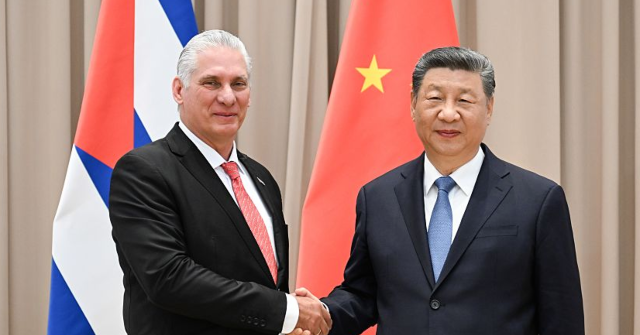Cuba’s figurehead “president” Miguel Díaz-Canel thanked Chinese Prosecutor General Ying Yong for China’s “training” of Cuban prosecutors during Ying’s weekend visit to the island nation.
The encounter, and Díaz-Canel’s “admission” that Cuba’s notoriously repressive prosecutors receive training from China, comes at a time when the communist regimes are attempting to deepen their ties. The Castro regime is seeking increased amounts of Chinese aid after pushing Cuba to the brink of complete ruin through its disastrous communist policies. According to the Cuban presidency, the visit also served to finalize a “comprehensive” Chinese emergency aid package to Cuba.
Ying arrived in Havana on Thursday for a weekend visit. Díaz-Canel, who did not publicly disclose details of the Chinese “training” of Cuban prosecutors, described Ying’s visit as “yet another expression of the important relationship that Cuba and China enjoy on a daily basis between our parties, governments, and peoples.”
Díaz-Canel thanked Ying for the “support his institution has given to the education and training of Cuban prosecutors.” Prior to his meeting with Diáz-Canel, Ying met with Cuban Prosecutor General Yamila Peña Ojeda to “maintain and strengthen” bilateral cooperation between their offices originally established in 2015.
“This visit comes at a particularly significant time for our countries because, in addition to discussing everything that lies ahead for our institutions, we will be celebrating the 65th anniversary of the establishment of bilateral relations next September,” Peña Ojeda said, adding that Cuba’s current scenario has “led us to continue searching for ways to maintain and improve everything the country has achieved, which keeps us standing strong, defending our socialist state of law and social justice, with the conviction that a better world will always be possible.”
The Cuban “president” asserted to Ying that both nations are building “a community with a shared future,” and referred to visits of Chinese Communist Party (CCP) officials to Cuba during 2024 such as CCP’s head of propaganda development Li Shulei and Special Representative of the Chinese Government for Latin American Affairs Qiu Xiaoqi.
According to the Cuban “president,” China revised the terms of its emergency aid package to Cuba, which will now include a shipment of 30,000 tons of rice, a donation of solar photovoltaic packs, and other photovoltaic systems for residential use, which will allegedly benefit “more than 10,000” Cuban families.
After more than six decades of neglect, Cuba is experiencing the ongoing collapse of its power grid. The worn out and barely functional infrastructure on the island cannot generate enough electricity to power all of Cuba at once. Although China has provided spare parts and other pieces of hardware to Cuba, the nation’s power grid continues to fail daily, leading to severe blackouts. As much as 42 percent of Cuba faced a simultaneous blackout over the weekend. According to the Cuban presidency, Díaz-Canel highlighted China’s delivery of parts and resources for Cuba’s power grid as part of the greater package of Chinese aid to Cuba, “including loans.”
According to Granma, the official newspaper of the Communist Party of Cuba, Ying received a commemorative seal from the Cuban Attorney General’s Office “in recognition of the level achieved in relations between the two bodies, with a positive impact on the exchange of experiences.”
Cuba’s increased dependence on Chinese aid to help offset the nation’s communist crises comes amid increased reports that China plans to build spy stations in Cuban territory to spy on the United States, given Cuba’s proximity to America. In May, members of the House Homeland Security Subcommittee on Transportation and Maritime Security held a hearing to investigate the reports of China’s anti-U.S. espionage activities in Cuba.
Reuters reported in late June that China is “quietly” replacing Russia as Cuba’s main benefactor after promises made by Russia — Cuba’s longtime benefactor during the Soviet era — “fizzled,” with China filling the void left by Russia through its predatory Belt and Road (BRI) debt trap program, of which Cuba is officially part.
Christian K. Caruzo is a Venezuelan writer and documents life under socialism. You can follow him on Twitter here.
Read the full article here


